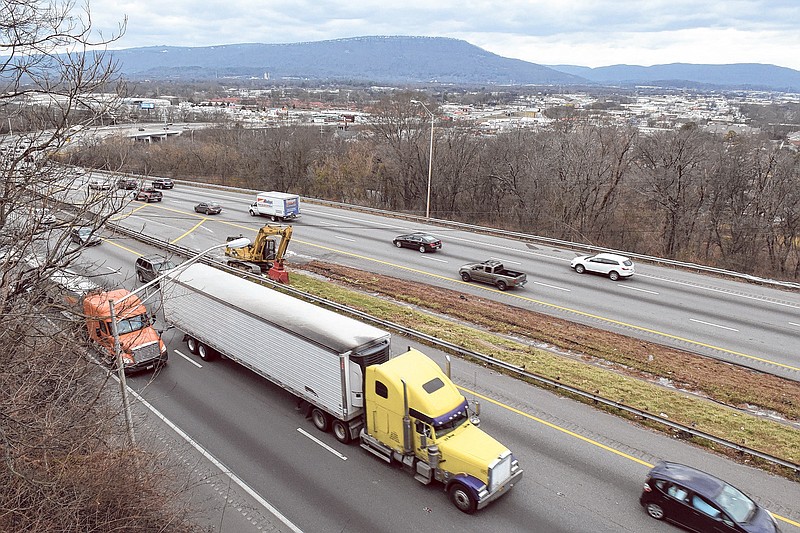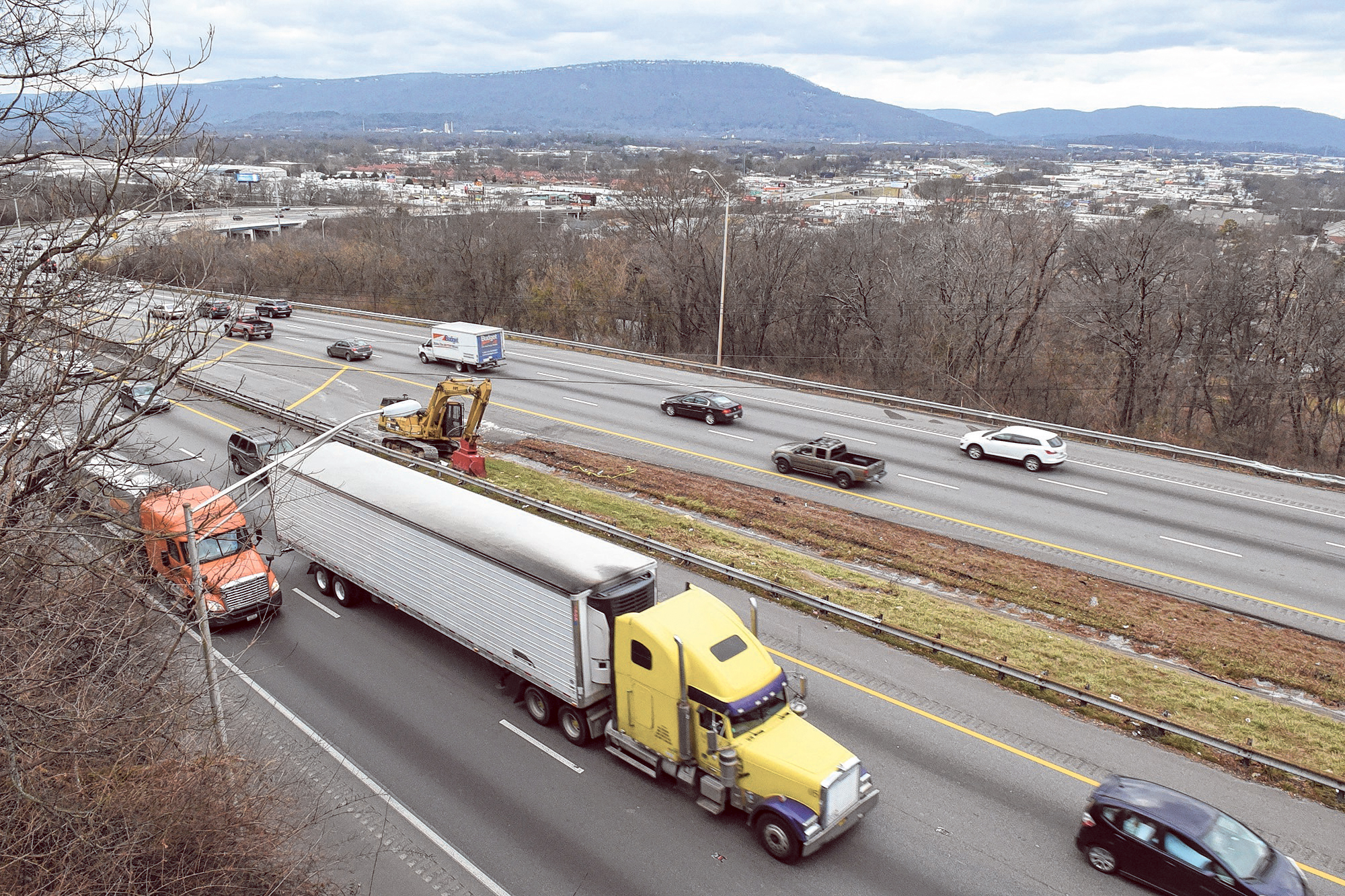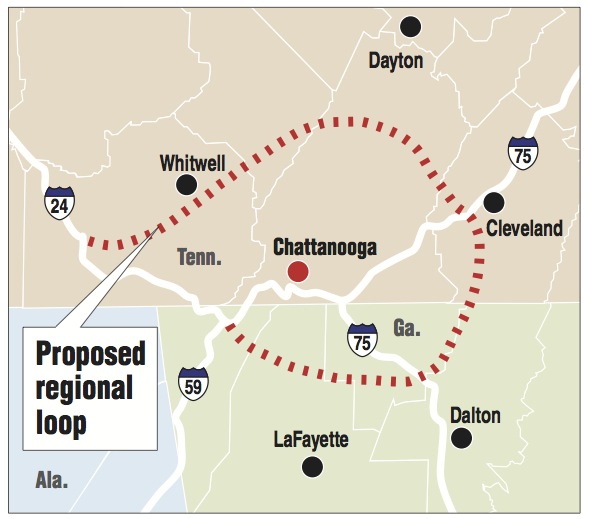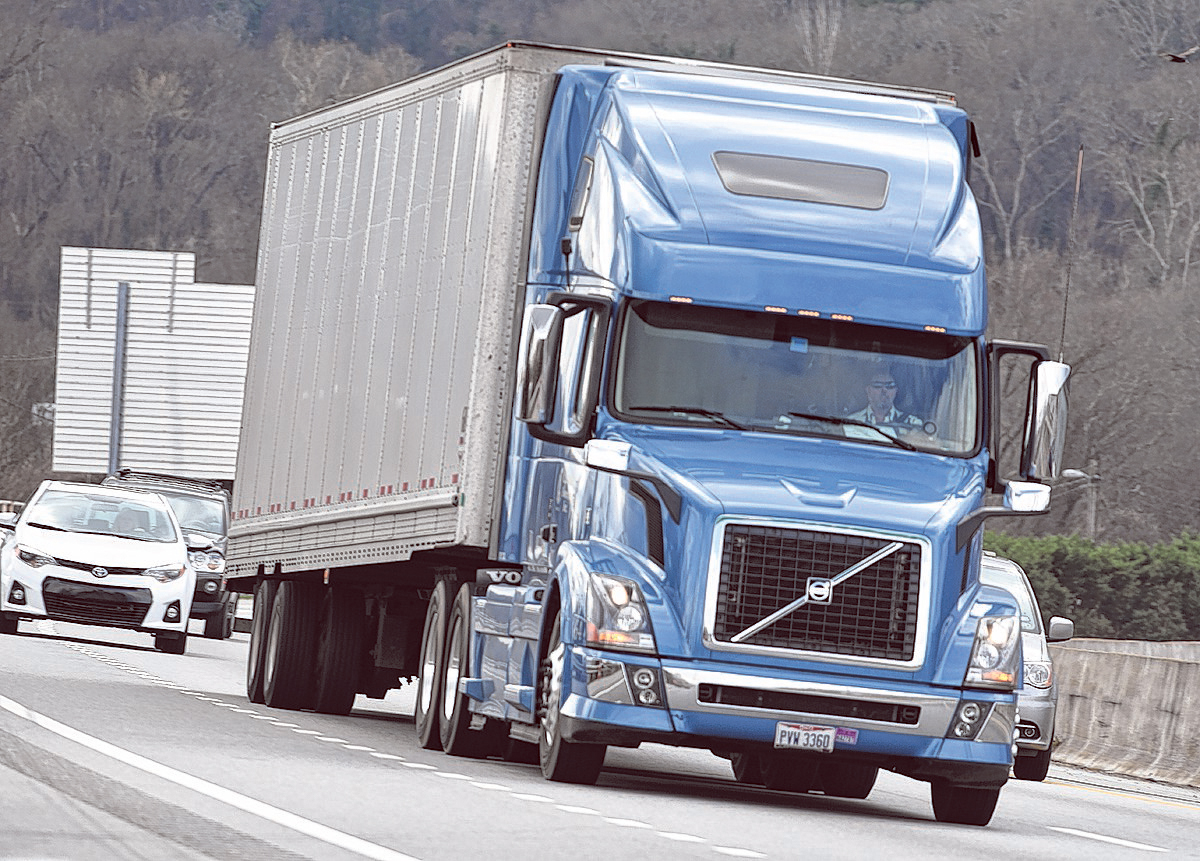If it seems as if there's a lot more truck traffic on Chattanooga's interstate highways, you're right, and it's on course to get worse before it gets better, planners say.
Chattanooga ranks No. 1 among all metropolitan cities in the volume of freight moving through by truck, helping clog the city's interstates and slowing the delivery of products, according to a freight study by Cambridge Systematics.
With some 80 percent of freight traveling through Chattanooga for delivery somewhere else -- tops of any metro countrywide -- transportation solutions are critical to the region, the planners say.
"What we know today is that there's worsening congestion," said Bridgett Massengill, project manager for Thrive 2055 -- the 40-year, 16-county regional planning initiative.
Problem sites
Interstate congestion in the Chattanooga area is the most cited problem by shippers. Among the problem sites: * I-24/I-75 interchange * I-24 and I-59 junction * I-24 from I-59 split to I-75 * I-75 from I-24 to Cleveland, Tenn. * I-24 over Missionary Ridge Source: Cambridge Systematics freight study About Thrive The Thrive 2055 growth initiative is crafting strategic plans in regional economic development, education and workforce training, transportation and natural treasures in the 16 counties surrounding Chattanooga in Tennessee, Georgia and Alabama. Later this year, after 36 months of work, Thrive planners will issue blueprints to help push the region ahead through 2055.
The study of freight traffic in the region noted that the key reason for Chattanooga's No. 1 ranking is that it's a "crossroads city." Three interstate highways, I-75, I-59, and I-24, connect in the Chattanooga area, making it a convergence point for trucks traffic.
More than 10,000 daily-through trucks utilize I-75, and over 9,000 do so on I-24, the study said.
"These through-truck trips are not directly related to economic activity in Chattanooga, but they increase congestion, crashes, pavement damage, and emissions," the study said.
Interstate congestion in the Chattanooga area is the most frequently cited problem by regional shippers in the study.
David Ferguson, executive vice president for logistics company Riverside Transport, agreed last week that the interstate highways make Chattanooga a key trucking hub and that even Atlanta to the South doesn't have the same kind of challenge when it comes to truck traffic.
"Chattanooga is a main vein to feed the Midwest ... and the Southeast," he said. "It makes sense that this hub will explode."
Problem locations
Problem locations include the I-24/I-75 interchange, the I-24 and I-59 junction, I-24 from the I-59 split to the I-75 split, and I-75 from I-24 to Cleveland, Tenn., the study said. Also, steep grades on I-24 over Missionary Ridge are seen as a bottleneck.
More industrial development in the region, including Volkswagen and Amazon, will continue to drive freight volume growth in the area, aggravating these problem sites, said the study.
Virtually all the interstate segments will be above their capacity by 2035, with some portions operating at more than twice for what they were designed.
"This will lead to much longer delays for all traffic, including trucks, and will introduce supply chain delays for local businesses and industry that rely on the efficient movement of freight," the study said.
Thrive officials are taking a multi-pronged approach to find remedies, including setting up a regional forum in which transportation planners from Chattanooga, Cleveland, Tenn., and Dalton, Ga. can regularly meet.
Connie Vaughan, McKee Foods's government relations manager and head of Thrive's transportation panel, said there's a chance for the groups to act regionally by identifying key road projects.
"We're starting to have those discussions," she said. "Which [projects] have the most impact in the region and prioritizing them and being a champion for them."
The biggest prospective road project in the Chattanooga area since construction of the interstate highways more than four decades ago already has emerged from Thrive with a potential perimeter highway looping around the city.
It's seen as better connecting cities such as Dalton and LaFayette in Georgia with Cleveland and Dayton in Tennessee, easing bottlenecks in Chattanooga and helping area commuters.
Vaughan said the loop road idea comes up at nearly every Thrive meeting.
"We still need to work through the [metropolitan planning organizations,]" she said.
Bypass benefit
The study said that developing interstate options which bypass Chattanooga could have significant benefits for the region.
Massengill also noted the problem of no organization existing in the three-state region that brings transportation planners together to coordinate actions.
The project manager said the three-state region has $5 billion in transportation projects for which funding already is identified, though not necessarily secured. Also, there's another $5 billion in so-called visionary projects for which money hasn't yet been identified, she said.
But federal lawmakers have struggled to come up with a way to pay for a boost in the nation's infrastructure funding. The 18.4-cents-per-gallon federal gas tax, which has not been increased since 1993, hasn't kept pace with infrastructure expenses as cars have become more fuel efficient.
The tax brings in about $34 billion per year. The federal government typically spends about $50 billion per year on road and transit projects even without the new projects being discussed in Chattanooga and other cities.
Decreasing revenue
The U.S. Office of Management and Budget projects that decreasing revenue from the motor vehicle fuel tax and a growing need for transportation projects will leave the highway trust fund facing a $170 billion deficit over the next decade unless Congress finds a new funding source.
John Bridger, the Chattanooga-Hamilton County Regional Planning Agency executive director, said key future transportation projects include freeing congestion on I-75 and I-24 and connecting Highway 58 to Bonny Oaks Drive. Also, he said, there's the widening of U.S. 27 downtown, Bonny Oaks Drive and Apison Pike.
Bridger said that to find transportation solutions, there needs to be a regional view. Also, when it comes to funding, public-private remedies ought to be eyed, he said.
"We're going to have to be creative," he said.
Ty Ross, Dalton's city administrator, especially cited efforts to widen I-75 from Dalton to Chattanooga as important to his city.
Moving trucks is "a real high priority," he said, citing the floorcovering industry in Dalton.
"It pays for Dalton to look to Chattanooga," Ross said.
The Thrive growth initiative is developing strategic plans in regional economic development, education, workforce training, and natural treasures in addition to transportation for the 16-county region.
Transportation is seen as the infrastructure that weaves all of the other segments together, Massengill said.
"Without it, we can't have access to jobs, educational opportunities and natural resources and treasures in the region," she said.
Vaughan said that at Collegedale-based McKee Foods, trucking is "pretty important for us."
"With just-in-time inventorying, trucks have to arrive on time," she said. "Advanced manufacturing depends on the delivery of inventories. Gone are the days of manufacturing that stockpiles lots of inventories."
Contact Mike Pare at mpare@timesfreepress.com or 423-757-6318.



